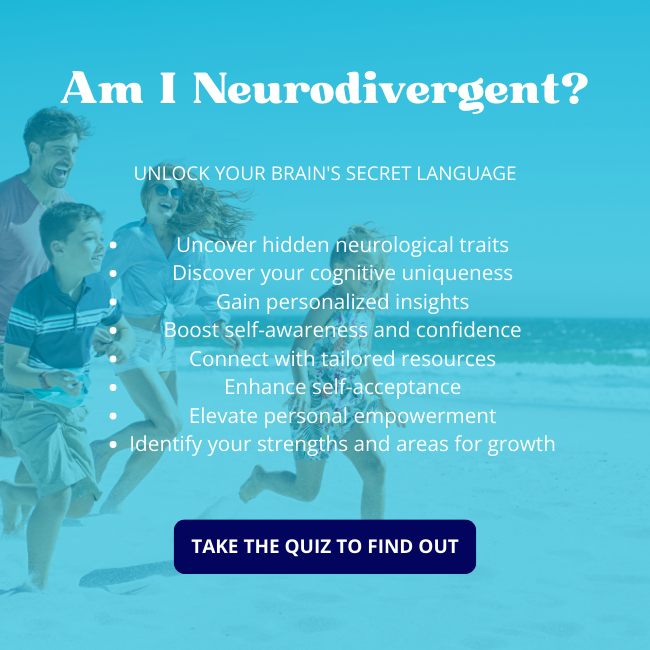The dialogue on neurodiversity has blossomed in recent times, fostering greater awareness and embracing the spectrum of neurological variations. At the heart of this evolving conversation lie neurodivergent assessments, instrumental in pinpointing and comprehending the myriad of neurodivergent characteristics and conditions.
Drawing from my extensive experience as a Board Certified Neurofeedback Provider and Certified School Psychologist, I've engaged with and developed numerous assessments for both children and adults. Among these, the QEEG brain mapping stands out as an exceptionally insightful technique, having conducted thousands of these assessments, to delve into the complexities of the brain.
The Spectrum of Neurodivergence
Neurodivergence or neurodiversity is a broad spectrum of neurological variations that affect how individuals perceive, process, and interact with the world around them. This spectrum includes conditions such as divergent autism, ADHD, dyslexia, and others, each with its unique set of characteristics and challenges.
For instance, neurodivergent autism often involves differences in social communication, sensory perception, and repetitive behaviors (Heasman & Gillespie, 2018), while neurotypical ADHD is marked by challenges with attention, hyperactivity, and impulsivity. Similarly, neurodivergent dyslexia manifests as difficulties with reading, spelling, and language processing.
However, it's essential to recognize that neurodivergence extends beyond these well-known conditions, as there are lesser-known variations and combinations of it. This diversity highlights the complexity of the neurodivergent experience, where individuals may exhibit a wide range of strengths and challenges across various domains.
Embracing neurodiversity involves acknowledging and valuing these differences, fostering environments that accommodate diverse cognitive styles, and supporting individuals in reaching their full potential.
The Importance of Neurodivergent Tests
Neurodivergent assessments serve as indispensable tools in facilitating self-awareness and comprehension of one's unique neurological makeup. Going through neurodivergent testing allows individuals to have an invaluable glimpse into a spectrum of cognitive capacities to understand their strengths and areas for potential growth (Val Danilov et al., 2022).
Exploring the dynamics of communication, sensory processing, and social interaction exposes different layers of individuality within neurodivergent individuals. It involves the administration of one to one tests that take a look at cognitive, attentional, behavioral and social functioning and its impact at home, relationships, and school or work.
Through these comprehensive assessments, individuals gain clarity regarding their distinctive and neurologically divergent profiles to empower them to navigate the world with greater understanding and self-acceptance.
Are you Neurodivergent?
Embracing the complexities of neurodiversity means embarking on a journey that is as enriching as it is challenging. It goes through diverse landscapes of human cognition, perception, and interaction, where each twist and turn presents opportunities for growth and understanding. To navigate neurodiversity effectively, one must cultivate an open mind and be ready to embrace the myriad expressions of neurological variance that grace our world.
Neurodivergent people encounter challenges that demand resilience and adaptability as they navigate through many complexities. Yet, amidst these trials lie moments of triumph, where the unique perspectives and talents inherent to neurodiversity shine brightly. It is through these triumphs that one discovers the richness and depth of human experience that transcends conventional norms and forges paths of innovation and creativity.
Central to this journey is the recognition and celebration of differences, not as obstacles to be overcome, but as vibrant threads woven into one’s individuality. Embracing these differences within ourselves and in others allows us to unlock our potential for profound connections and collective growth. Navigating neurodiversity becomes not merely a challenge, but a transformation toward greater empathy, inclusion, and understanding.
How to Get Tested for Neurodivergence
Many individuals may find themselves questioning whether they fall within the realm of neurodivergence. This neurodiversity test serves as a starting point for self-exploration, as it offers a series of questions designed to assess various neurodivergent traits and experiences.
Neurodivergence tests are powerful tools for self-discovery and understanding within the context of neurodiversity. When you take quizzes, you help foster greater awareness and acceptance of neurological differences. With it, we can create a more inclusive and supportive environment for individuals across the neurodivergent spectrum.
Am I neurodivergent or just weird?
Determining whether you're neurodivergent or just feeling “weird” can be complex and may require a complex understanding of one’s neurodivergences. Consulting with a professional and undergoing a neurodivergent test can provide valuable insights into your cognitive patterns and help differentiate between typical variations and potential undiagnosed neurodivergent traits.
What type of neurodivergent am I?
To accurately determine what type of neurodivergent you are, it's essential to undergo a comprehensive neurotypical test or neurodivergent test for adults, children, or teens, which can identify specific cognitive patterns and traits.
Am I neurotypical?
To ascertain if you're neurotypical, it's crucial to undergo a thorough test for neurodivergent traits. Neurodivergent testing can provide insights into your cognitive functioning and identify any deviations from the norm.
Am I neurodiverse in thinking?
To determine if you're neurodiverse in thinking, consider taking a neurodiversity quiz or undergoing a test for neurodivergent traits, which can help identify unique cognitive patterns and variations from the norm.
What does neurodistinct mean?
Concerning atypical vs neurodivergent, neurodistinct refers to individuals whose neurological functioning deviates significantly from typical patterns, often characterized by unique cognitive processes and behaviors. Being neurological divergent highlights the distinction between atypical neurological functioning and the broader concept of neurodivergence.
Is brain quiz legit?
Brain quizzes can provide some insights into cognitive functioning but should not be considered a substitute for a formal neurodivergent diagnosis or assessment for neurotypical disorder by a qualified professional, as they may lack the specificity and accuracy required for diagnosis.
Is my child neurodivergent?
This requires observation of the signs of a neurodivergent child such as atypical social interactions or sensory sensitivities. The use of divergent personality tests can also provide insights into their cognitive functioning and potential neurodivergent traits.
What sort of person am I?
If you’re asking, “What type of a person am I?”, then you might identify as someone who exhibits cognitive patterns and behaviors outside of the non-neurotypical range, which is the neuroatypical definition. Understanding your unique cognitive profile can help you navigate the world more effectively and access support tailored to your specific needs.
Am I neurodivergent or traumatized?
Determining whether you're neurodivergent or potentially affected by trauma involves undergoing comprehensive assessments, such as ADHD or autism tests to identify cognitive patterns and potential neurodivergent traits. Consulting with specialists trained in both neurodivergence and trauma can offer clarity on your experiences and guide appropriate support and interventions tailored to your needs as the neurodivergent woman or man in your family.
What does neurospicy mean?
Neurospicy is a slang term used to describe someone who is neurodivergent. A neurospicy brain has unique ways of thinking and experiencing the world that differ from what's considered typical. A person is neurospicy meaning there’s a distinct flavor in the spectrum of his brain, adding intrigue and individuality to his personality.
Citations
Heasman, B., & Gillespie, A. (2018). Neurodivergent intersubjectivity: Distinctive features of how autistic people create shared understanding. Autism, 23(4), 910–921. https://doi.org/10.1177/1362361318785172
Val Danilov, I., Svajyan, A., & Mihailova, S. (2022). Computerized Assessment of Cognitive Development in Neurotypical and Neurodivergent Children. OBM Neurobiology, 06(03), 1–8. https://doi.org/10.21926/obm.neurobiol.2203137
Dr. Roseann is a mental health expert in Neurodivergence who frequently is in the media:
- Helping Children Thrive Podcast Benefits of Neurofeedback for children with ADHD
- Very Well Mind New Research Highlights Key Differences Among Autistic Boys and Girls
- Healthline Understanding Self-Regulation Skills
Always remember… “Calm Brain, Happy Family™”
Disclaimer: This article is not intended to give health advice and it is recommended to consult with a physician before beginning any new wellness regime. *The effectiveness of diagnosis and treatment vary by patient and condition. Dr. Roseann Capanna-Hodge, LLC does not guarantee certain results.
Are you looking for SOLUTIONS for your struggling child or teen?
Dr. Roseann and her team are all about science-backed solutions, so you are in the right place!
Grab your complimentary copy of
147 Therapist-Endorsed Self-Regulation Strategies for Children: A Practical Guide for Parents
Dr. Roseann is a Children’s Mental Health Expert and Licensed Therapist who has been featured in/on hundreds of media outlets including The Mel Robbins Show, CBS, NBC, PIX11 NYC, Today, FORBES, CNN, The New York Times, The Washington Post, Business Insider, Women’s Day, Healthline, CNET, Parade Magazine and PARENTS. FORBES called her, “A thought leader in children’s mental health.”

She coined the terms, “Re-entry panic syndrome” and “eco-anxiety” and is a frequent contributor to media on mental health.
Dr. Roseann Capanna-Hodge has three decades of experience in working with children, teens and their families with attention-deficit hyperactivity disorder (ADHD), autism, concussion, dyslexia and learning disability, anxiety, Obsessive Compulsive Disorder (OCD), depression and mood disorder, Lyme Disease, and PANS/PANDAS using science-backed natural mental health solutions such as supplements, magnesium, nutrition, QEEG Brain maps, neurofeedback, PEMF, psychotherapy and other non-medication approaches.
She is the author of three bestselling books, It’s Gonna Be OK!: Proven Ways to Improve Your Child's Mental Health, The Teletherapy Toolkit, and Brain Under Attack. Dr. Roseann is known for offering a message of hope through science-endorsed methods that promote a calm brain.
Her trademarked BrainBehaviorResetⓇ Program and It’s Gonna be OK!Ⓡ Podcast has been a cornerstone for thousands of parents facing mental health, behavioral or neurodevelopmental challenges.
She is the founder and director of The Global Institute of Children’s Mental Health, Neurotastic™Brain Formulas and Dr. Roseann Capanna-Hodge, LLC. Dr. Roseann is a Board Certified Neurofeedback (BCN) Practitioner, a Board Member of the Northeast Region Biofeedback Society (NRBS), Certified Integrative Mental Health Professional (CIMHP) and an Amen Clinic Certified Brain Health Coach. She is also a member of The International Lyme Disease and Associated Disease Society (ILADS), The American Psychological Association (APA), Anxiety and Depression Association of America (ADAA) National Association of School Psychologists (NASP), International OCD Foundation (IOCDF).
© Roseann-Capanna-Hodge, LLC 2024











